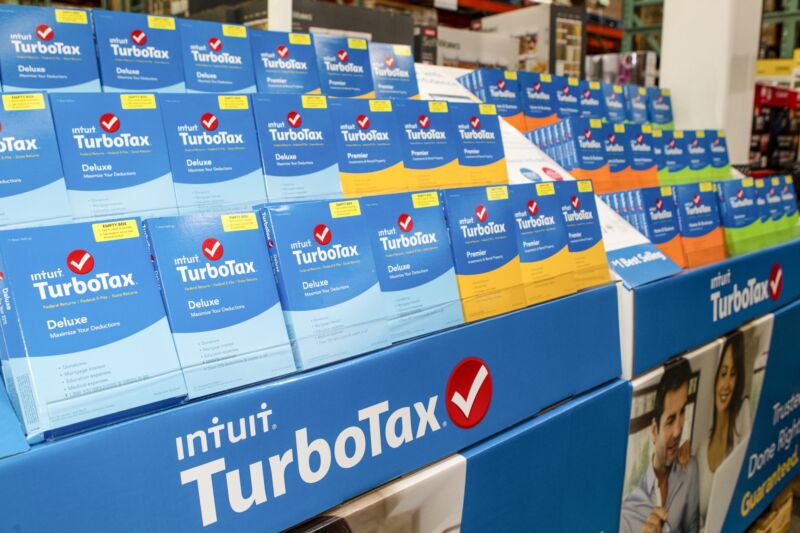
The Federal Trade Commission sued Intuit on Monday, alleging that it deceptively advertises "free" tax filing with TurboTax. Intuit's deceptive tactics pushed customers toward paid products—even in cases where they were eligible for the no-cost Free File program for people with low and moderate incomes, the FTC said.
The FTC asked a judge to issue a temporary restraining order and preliminary injunction forcing Intuit to stop "disseminating the deceptive claim that consumers can file their taxes for free using TurboTax when in truth, in numerous instances Defendant does not permit consumers to file their taxes for free using TurboTax." If approved by the court, a proposed order submitted by the FTC would force Intuit to either stop claiming its product is free or to conspicuously include all the limitations in ads "so as to leave no reasonable probability that the terms of the offer might be misunderstood."
The FTC said Intuit makes misleading claims about TurboTax in paid advertisements and on its website. "Much of Intuit's advertising for TurboTax conveys the message that consumers can file their taxes for free using TurboTax, even going so far as to air commercials in which almost every word spoken is the word 'free,'" the FTC said in its complaint filed in US District Court for the Northern District of California. Intuit said it will fight the lawsuit in a response that called the FTC's allegations inaccurate.
The Intuit commercials cited by the FTC include one with an auctioneer repeatedly saying "free," "another in which a court stenographer recorded a legal proceeding in which 'free' was the only word used, and another in which an exercise class instructor chants 'free' while leading a group workout," the FTC said.
"In several ads, the word 'free' is repeated over 40 times in a 30-second ad," the FTC said. The FTC's emergency motion asked the court to "immediately halt Defendant Intuit Inc.'s deceptive advertising of TurboTax."
FTC: Fine-print disclaimers inadequate
The fine-print disclaimer at the end of commercials informs viewers "that the offer is limited to consumers with 'simple tax returns' or 'simple US returns only.'" The FTC said these "disclaimers are inadequate to cure the misrepresentation that consumers can file their taxes for free using TurboTax." The disclaimers are "disproportionately small," appear for just a few seconds, and are "often in [a] font color similar to the background color, and are not read by a voiceover."
Intuit has repeatedly changed its definition of "simple tax return" over the past few years, the FTC said. The latest definition is "a return that can be filed on a Form 1040 with limited attached schedules to cover a few distinct tax situations, including student loan interest paid."
The FTC said TurboTax's freemium version excludes people filing certain types of 1099 forms, regardless of their income. Consumers who aren't eligible include those "who receive independent contractor or small business income, such as consumers working in the gig economy by, for example, providing rideshare services or delivering groceries," the FTC said.
Intuit: FTC arguments “simply not credible”
Intuit Executive VP and General Counsel Kerry McLean said, "The FTC's arguments are simply not credible. Far from steering taxpayers away from free tax preparation offerings, our free advertising campaigns have led to more Americans filing their taxes for free than ever before and have been central to raising awareness of free tax prep."
McLean said TurboTax has helped nearly 100 million Americans file taxes for free over the last eight years and that its latest advertising campaign drove "approximately 60 percent growth from 11 million free filers in 2018 before the campaign launched to more than 17 million free filers in 2021."
“Hard stops” on TurboTax website
The FTC lawsuit said that taxpayers who go to TurboTax's website seeking free tax filing are met with various "hard stops" that urge them to upgrade to versions costing $59 or $119 for federal tax returns. (TurboTax charges an additional fee for state tax returns.) The complaint also said:
Intuit's deceptive door-opener ads described above bring consumers to the TurboTax website representing that consumers can file their taxes for free using TurboTax, but once there, many consumers encounter screens that inform them that they cannot complete and file their taxes for free. In the case of the Hard Stop screens, this confrontation comes after consumers have already created a TurboTax account and expended substantial time inputting sensitive personal and financial information into Intuit's user interface.
Customers are induced "to upgrade to a paid version based on certain types of income, such as income from a farm, farm rental or farm equipment; selling a home; a prior year state tax refund; or investments... [or] when seeking certain tax credits or deductions," the FTC said. After encountering a "hard stop" screen, customers "are later required to pay for the upgraded version of TurboTax, either by providing payment information or agreeing to an additional charge to pay using their tax refund after their returns have been prepared and are ready to file."
reader comments
273